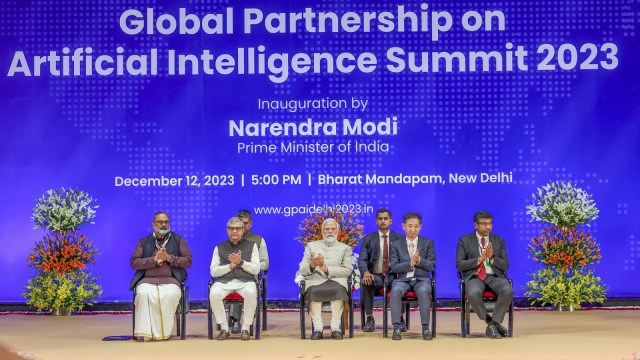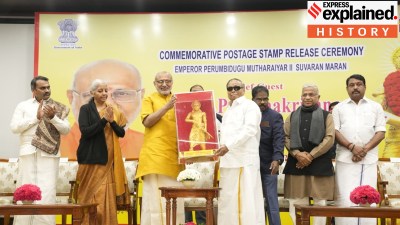FLAGGING THE dual potential of Artificial Intelligence (AI) — that while it can be 21st century’s biggest development tool, it can also potentially play the biggest role in its destruction —Prime Minister Narendra Modi on Tuesday called for a global framework that will provide guardrails and make its use more responsible.
Addressing the Global Partnership on AI (GPAI) Summit, Modi advised the need to exercise extreme caution in the deployment of AI. “AI will impact current and future generations. We should move forward with utmost caution,” he said, adding, “AI is transformative, but we should make it more transparent. Datasets and algorithms free from bias will be a good start. We have to make people believe that AI is for their benefit.”

The PM flagged deepfakes, cybersecurity and cyber-terrorism as concerns that emanate from unchecked development of AI tools. He also asked if there could be an audit mechanism to categorise AI tools into red, yellow or green, as per their capabilities. “If terrorist organisations have AI-enabled weapons, it will have a big impact on global security,” he said.
India is negotiating with GPAI member countries for a consensus on a declaration document on the proper use of AI, the guardrails for the technology, and how it can be democratised.
While details of the final declaration are not known, IT Minister Ashwini Vaishnaw said it would have two aspects highlighting India’s stand. “The first is to evaluate the use of AI in sustainable agriculture, adding to the previous GPAI themes including healthcare, climate action and building a resilient society. The second is on collaborative AI, in line with our DPI (digital public infrastructure) approach,” Vaishnaw had said earlier.
The Indian Express had earlier reported on how India wants to take the DPI approach with AI, where it aims to build underlying systems — both databases and compute capacity — for facilitating the spread of AI. It is an approach the country has taken with the biometric identity programme, Aadhaar, and payments solution, Unified Payments Interface (UPI).
A ministers’ declaration was signed in Tokyo last year, when Japan was hosting the GPAI. The Tokyo declaration opposed unlawful and irresponsible use of AI and other technologies.
Story continues below this ad
Identifying AI as a key driver of economic growth, Modi said that India will soon launch its AI mission, to establish AI compute power for startups and innovators. “Under this, AI applications in sectors like agriculture, health and education will be promoted. This will take AI skills to Tier 2 and Tier 3 cities of the country,” he said.
Modi suggested that ethical use of AI should be the guiding principle for a global framework. He said that development and deployment protocols around high-risk and frontier AI systems should be included in such a framework.
“If AI’s developmental journey is more inclusive, its results will be too. Last decade’s technologies created a problem of unequal access and exacerbated society’s inequality,” Modi said. “When democratic values are attached to technology, then it works as a multiplier towards inclusion. So AI’s future will also depend on human and democratic values,” he added.
Saying that AI’s biggest power is connecting people, Modi added that its right use would ensure not just economic growth but also equality and social justice.
Story continues below this ad
The PM urged governments and tech companies to think how to increase the credibility of AI-generated information. “The datasets on which we train and test AI tools — how much should they be tested before launch? Can we also introduce a watermark to indicate that a particular piece of content is AI-generated,” he said.
Modi also urged the central and state governments to use AI for “evidence-based decision-making”. “In India, many languages are spoken in thousands of dialects. We should explore if AI can be used to revive languages not spoken today. Sanskrit literature can be furthered through AI. Missing volumes of Vedic maths can also be generated through it,” he said.
India is a founding member of GPAI and the incoming chair of the grouping, having joined the multi-stakeholder initiative in June 2020. It consists of 28 member nations along with the European Union.
The initiative aims “to bridge the gap between theory and practice on AI by supporting cutting-edge research and applied activities on AI-related priorities.”
Story continues below this ad
It also brings together people involved in the fields of science, industry and civil society, along with governments, international organisations and academia, for greater international cooperation. The first three GPAI summits were held in Montreal, Paris and Tokyo, respectively.









